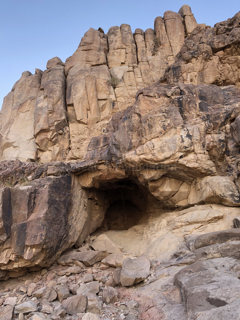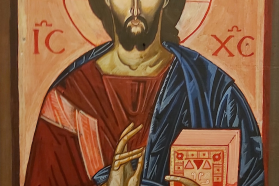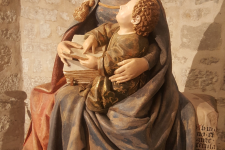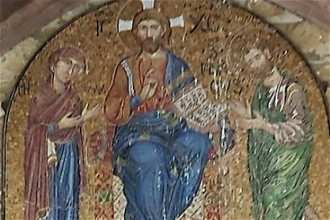Sunday Reflection with Fr Robin Gibbons - 9 August 2020

Cave of Elijah
Nineteenth Sunday of Ordinary Time
Forgive me if I start my reflection on a downwards note, that of Elijah, who has just battled with the priests of `Baal at Mount Carmel, has won the religious duel, the 'fire' of the Lord consumed his offering but not that of the prophets of `Baal, so he has them all slaughtered and flees from the retribution of Jezebel who is going to kill him. So here he is, a day's journey from Beer Sheba depressed, alone and lonely, Elijah "went a day's journey into the wilderness, until he came to a solitary broom tree and sat beneath it. He prayed for death: "Enough, LORD! Take my life, for I am no better than my ancestors."(I Kgs 19: 4) Now this is not what you might expect as a prelude to the passage we hear as the first reading today, a magnificent evocation of the approach of God. We might imagine that a personal encounter between Elijah and God is all about the worthiness and spiritual depth of the prophet. Not a bit of it, and it is a wonderful passage for us all to reflect on what I might call the 'capriciousness' of God, or rather the absolute openness of God to everybody and anyone, no matter what they have done or who they are!
Let's journey a little further with our prophet, his prayer, short and sweet is pretty blunt, 'I want out, I want death I have failed' We know why he thinks he has failed, for those of us in ministry this mind-set is one we often struggle with, perhaps are tempted to at this very strange point in our faith lives, when Covid has turned everything upside down and nothing is as it was a few months ago, a big question for our parish and community life is will it ever be again? Elijah doesn't help at this point, his depression is slightly eased by a messenger, who we find is an angel, and then the story takes a surprising turn, from flight, Elijah journeys for 40 days and nights to Mount Horeb. This is the change, at Mount Horeb, a theophany takes place, vibrantly described as Elijah hiding first in a cave to witness the procession of natural phenomena, none of which is the actual moment when the Lord is encountered, until after all the noise of destruction and fire, this: "the LORD was not in the fire; after the fire, a light silent sound.*
When he heard this, Elijah hid his face in his cloak and went out and stood at the entrance of the cave".(IKgs 19:12,13)
What does this mean for us? I've hinted that it isn't to do with perceptions of holiness or worthiness, but it has everything to do with our vocation as Christians. That wonderful translation of the moment of encounter as hearing 'a light silent sound' goes to the heart of our relationship with God. We have to work at a relationship, to really listen, and it is then that a deep wordless dialogue starts. The Lord tells Elijah to go back and carry on his prophetic work in a radically changed situation, but encourages him in a distinct mission and gains a close and important disciple, Elisha, who will take on his mantle, literally and figuratively.
This emerges in the Matthew's account of Jesus walking on the water towards the terrified disciples in the boat, they too at a moment of perilous change here a whispering voice telling them to not be afraid, but the real encounter is the drowning Peter who cries for help;' Immediately Jesus stretched out his hand and caught him, and said to him, "O you of little faith,* why did you doubt?" (Mt 14:31)
So, what can these mean for us? You will no doubt find your despondent moments, your own rage, anger or depression about God! Think of Elijah and Peter, they are unlikely heroes, unlikely saints, they break our narrow interpretations. If anything the story is telling us nobody can be cut off from God, and the way we discern and discover God is not through noisy discussion, debate, or paying too much attention to what people say, neither is it by management techniques, rather it is about being open to the Word, even in the dark times, to God being there, really there-and to remind ourselves, that each of us, no matter who we are, has some share in bringing about the Kingdom of God, and God wants us to be involved!
Reflection
St John Henry Newman
From Sermon 24: Elijah the Prophet of the latter days
Let us, then, think it enough, with the Prophets of old, to be patient, to pray, and to wait. "The effectual fervent prayer of a righteous man availeth much ... The prayer of faith shall save the sick, and the Lord shall raise him up ... Be patient, therefore, brethren, unto the coming of the Lord. Behold, the husbandman waiteth for the precious fruit of the earth, and hath long patience for it, until he {379} receive the early and latter rain." A Prophet of God was satisfied, in silence, though with a full heart, to build the altar of God of twelve stones, in remembrance of the number of the tribes of the sons of Jacob, on the barren top of Carmel, and to do no more. He was satisfied to minister to the widow and fatherless, though it were only, if so be, to bring their sin to remembrance. He was satisfied to do his work in his day, though the only fruit of it were, that Jehoram should talk with Gehazi of all the great things which Elisha had done. He was satisfied with the reverence and affection of the Shunammite in private, while the world at large was scoffing at him. Let us, in like manner, feel certain, as well we may, that however great are the disorders of this present age, and though the unbelieving seek and find not, yet that to the humble and lowly, the earnest-minded and pure in heart, the Lord God of Elijah still reveals Himself. The Presence of Christ is still among us, in spite of our many sins and the sins of our people. "The spirit and power of Elias" should now especially be with us, because the notes of his day are among us.
Saint John Chrysostom
Jesus' Walk on the Sea - 2
What did Peter then say, given that he was ardent in everything he did, and always a step in front of the others?
'Lord, if it is you, bid me come to you on the water'.
He didn't say, 'Pray and entreat', but, 'Bid'. Do you see his great ardour, his great faith? Yet this certainly often landed him in danger, making him seek things above his bent. Here, too, he asked a very great thing, though out of love rather than to show off. Because he didn't say 'Bid me walk on the water', but what? 'Bid me come to you'. No-one loved Jesus so much.
Fr Robin is an Eastern Rite Catholic Chaplain for Melkites in the UK. He is also an Ecumenical Canon of Christ Church Cathedral, Oxford. You can follow him on Twitter: @RobinGibbons2


















